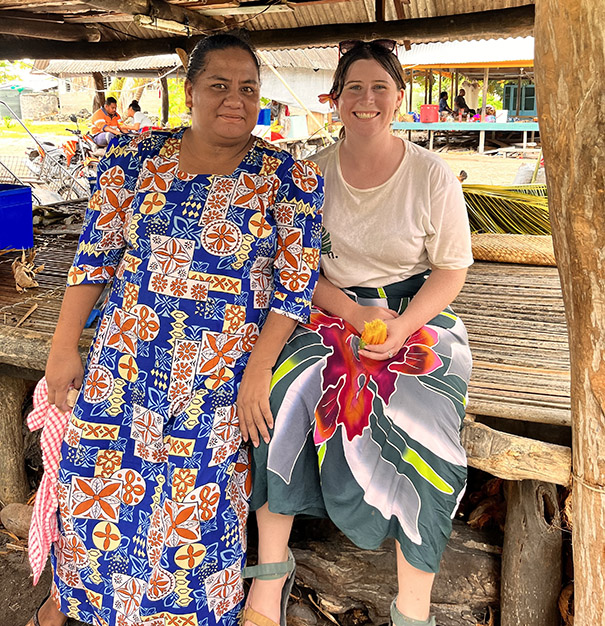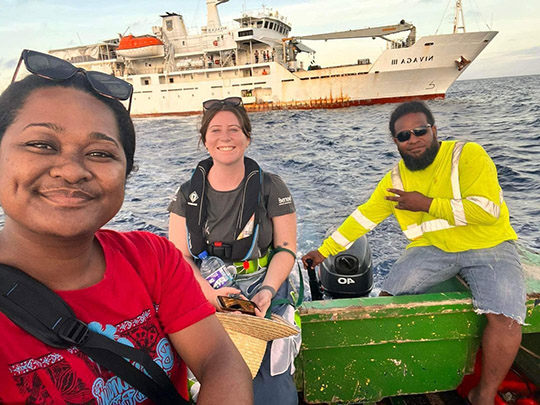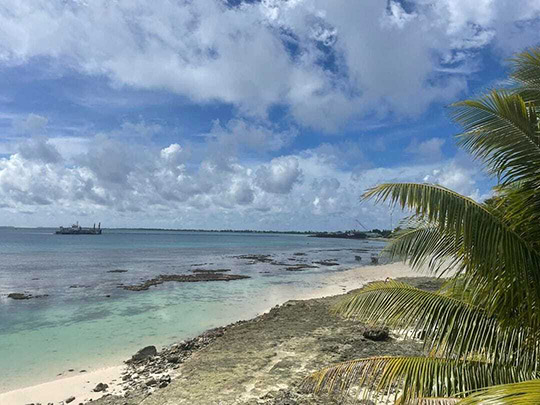It is a group of islands in the Pacific totaling 26 square kilometres, home to almost 12,000 people, and one of the least visited tourist locations in the world, but Tuvalu is a focus of research into the impact of climate change, including by University of Newcastle honours student, Jess Rodham who visited Tuvalu as part of her New Colombo Plan scholarship.
With an elevation of only two metres above sea level, Tuvalu is one of the world's most vulnerable nations to the severe consequences of climate change.
“Rising sea levels, coastal erosion, storm surges, unpredictable rainfall, drought, worsening cyclones, and deteriorating marine resources are more than a future prediction for Tuvalu, these impacts are being felt every day,” Jess says.
A double degree student in Business (Politics and International Policy) and Development Studies (Globalisation and Economics) at the University of Newcastle, Jess believes that in confronting global warming, her generation has been delivered one of the world's biggest existential crises.
“It is a deeply human issue that will have devastating consequences if we cannot change the way we treat mother earth,” Jess says.
“Studying a balance of economics, globalisation, environmental science, politics, development studies and human rights issues has given me a broad understanding of international issues, but being on the ground in a place like Tuvalu has made all the theory alive and very real.”
During the study component of her NCP program, Jess is conducting honours research in Tuvalu and her current host location in Samoa with the Secretariat of the Pacific Regional Environment Programme (SPREP).
She says her thesis focuses on researching the non-economic loss and damage experienced in the Pacific.
“I want to be able to contribute crucial data and discussion to the discourse around the role of non-economic loss and damage, such as the important place of emotions in recounting climate change experiences that reveal the full cost of the crisis,” Jess says.
“Importantly, I hope to contribute to the expansion of knowledge holistically by incorporating emotional and Pacific-led discussion.”
In Tuvalu, Jess has interviewed more than 75 people and has also made the journey by boat to three of the outer islands to canvass views and experiences.
“The one-week journey, the culture, food, language and living conditions did present challenges but it was such a valuable experience to live, eat and laugh with the locals and to experience what it really means to live in the outer islands of Tuvalu,” she says.
“The determination of the Tuvaluan people to fight for their unique and beautiful island home shone through in every place I visited, and I can't blame them – losing these islands and the damage this would cause the culture and people is almost too devastating to contemplate.”
Jess, who is the 2023 NCP Samoa Fellow, says that without the NCP Scholarship she would have stayed in Australia and learnt about the impact climate change is having in the Pacific through a screen.
“The Fellowship has given me a special opportunity to gain a grounded understanding of the issue of climate change by travelling to one of the most impacted countries in the world,” she says.
“Now I'm working to create a thesis that is Pacific-led and that centres the voices of the people of the Blue Pacific Continent.
“This just wouldn't have been possible without creating person-to-person connections and seeing the impact of climate change with my own eyes.”
Jess says friendships in Tuvalu were forged quickly but firmly and connections with essential Tuvalu non-government organisations such as Tuvalu Climate Action Network (TuCAN) and the Tuvalu Family Health Association (TuFHA) and the Government of Tuvalu, are also valuable to her ongoing her research in Samoa.
“The Tuvalu people in their determination and strength have fueled my passion to continue to fight for climate action – Save Tuvalu, save the world,” she says.
“Sometimes, the climate crisis can make us feel a bit helpless and hopeless. The people of Tuvalu love their country, their culture, and their community fiercely, and continue to make their case on the international stage. From them I have learnt not to give up hope.
“I want to go back to Tuvalu once my thesis is completed to share my findings and reconnect with participants and reinforce these relationships so that in any future research, I can include Pacific voices and people in all stages of the process.
“And as I continue to work with SPREP and the team in Climate Change Resilience I want to create strong bonds to support future collaboration.
“I'm so grateful for the support I have found in both Tuvalu and Samoa to do the research and I hope the thesis will have the kind of outcomes that make an impact in the fight against climate change.”




